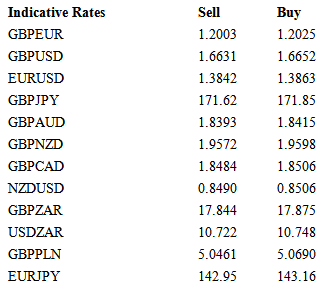Movement is very much on the low side as we enter the European session today following a lack of data yesterday and few new developments in Ukraine, the main geo-political story at the moment. Comments from some central bankers and their advisors did give the markets a little bit of volatility yesterday.
Charlie Bean, the Bank of England’s Deputy Governor for Monetary Policy, spoke yesterday to a group of business leaders in Darlington. When asked about sterling he said that “any further appreciation of sterling, which has risen almost 10% in trade-weighted terms since March, would not be particularly helpful in terms of facilitating a rebalancing towards net exports”. He also said that exports have been disappointing, although it may be “only a matter of time” before trade begins to improve as those economies we enjoy significant trade ties with improve.
These comments were good enough for a good 0.5% off losses in GBPUSD and briefly pressed sterling down to below the 1.20 level in GBPEUR. There may have been some sterling selling as well ahead of Carney’s testimony in front of the Treasury Select Committee due this morning. Carney – alongside Paul Fisher, David Miles and Martin Fisher – will testify in front of MPs on the changes to forward guidance outlined in the recent Quarterly Inflation Report. However, the pointed questions will more likely revolve around accusations that the Bank of England was complicit in some form of abuse in currency markets. We would wager that this will be Carney’s most uncomfortable appearance in front of TSC.
Elsewhere, EUR was weakened following a report in the Telegraph that a German think tank is calling for a “QE-style blitz” in order to avert a slip into deflation. EURUSD peeled back from 1.39 to the mid-1.38s as Marcel Fratzscher, head of the German Institute for Economic Research in Berlin, called for EUR60bn of bond purchases each month until the threat of deflation was taken care of. Christian Noyer, Bank of France member at the ECB, echoed sentiment that the euro was too strong at the moment but that the Eurozone did not face deflation. The calls for the ECB to make amends to its policy are increasing in volume and urgency.
A function of this is we are looking for GBPEUR to rebound from these lows through the week.
As was expected, the Bank of Japan have decided to hold policy as is this month. This will not last in our eyes and believe that Japan’s progression through 2014 will be marked by a strong stumble in growth and confidence, following the imposition of an increase in sales taxes that will kill off any recent improvements in consumer spending dynamics. Growth and spending have already been brought forward into Q1, to avoid the April 1st deadline, and then fall from a cliff afterwards. Growth yesterday morning was shown to have been around ¼ of expectations in Q4 of last year. The Bank of Japan is likely to ride into the monetary battle with further purchases of Japanese government debt and Exchange Traded Funds in order to further weaken the yen, promote liquidity and generate stock market gains. USDJPY remains 0.4% from its highs YTD.
Australian business confidence slipped overnight, losing around half of the gains, most post-election. Jobs and sales were the main fallers through the index and show that continual weakness in the recovery will be marked.

Which stock should you buy in your very next trade?
AI computing powers are changing the stock market. Investing.com's ProPicks AI includes 6 winning stock portfolios chosen by our advanced AI. In 2024 alone, ProPicks AI identified 2 stocks that surged over 150%, 4 additional stocks that leaped over 30%, and 3 more that climbed over 25%. Which stock will be the next to soar?
Unlock ProPicks AI